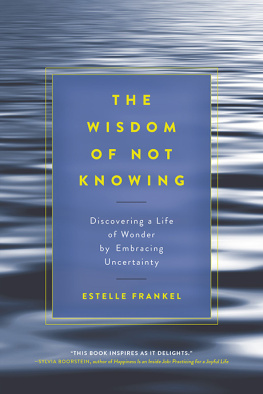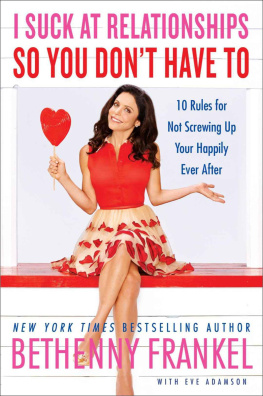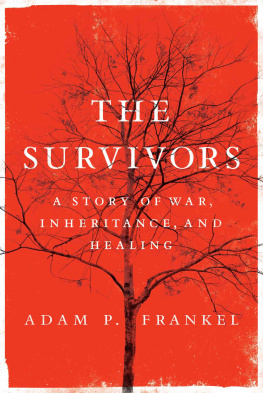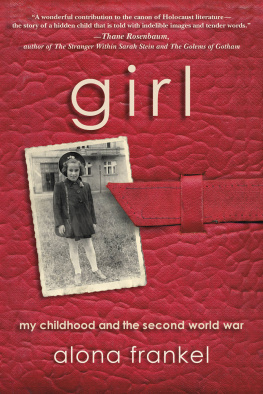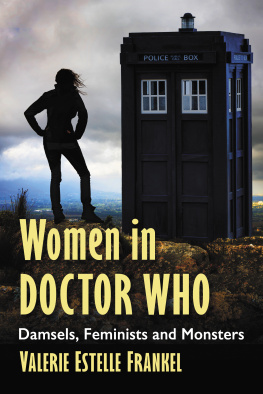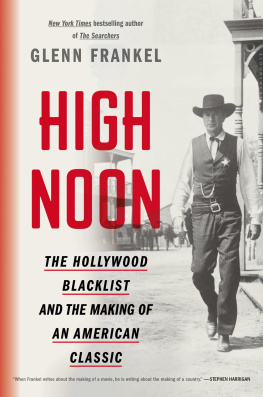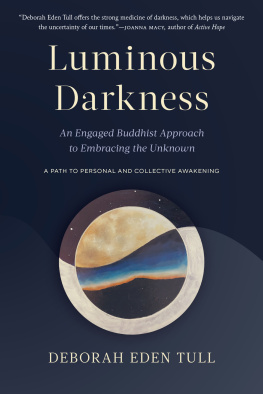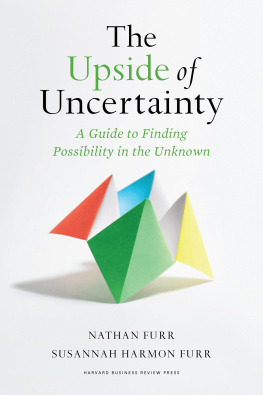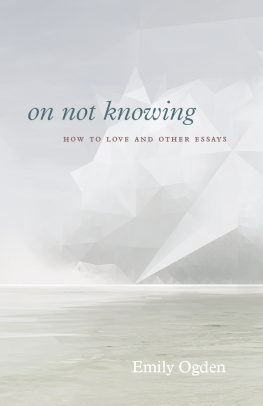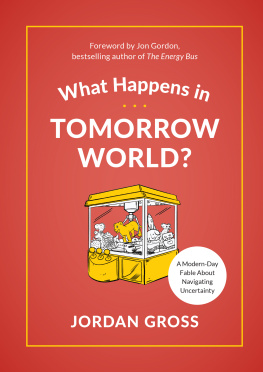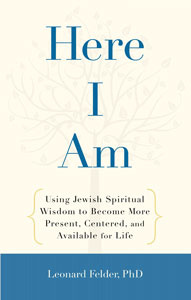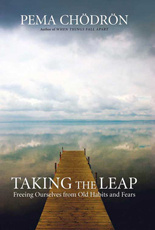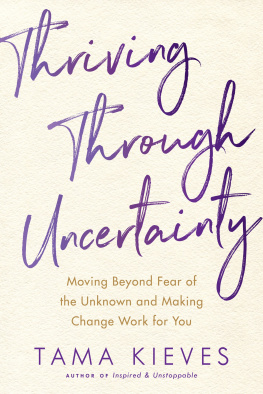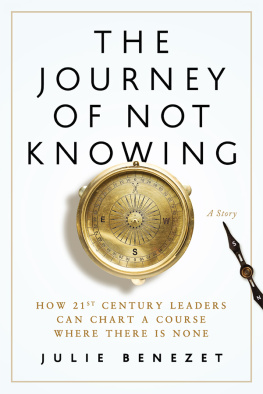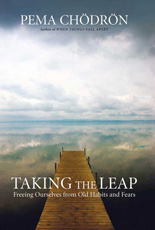Sign up to receive news and special offers from Shambhala Publications.

Or visit us online to sign up at shambhala.com/eshambhala.
The Wisdom of Not Knowing

DISCOVERING A LIFE OF WONDER BY EMBRACING UNCERTAINTY
Estelle Frankel

Shambhala
Boulder
2017
Shambhala Publications, Inc.
4720 Walnut Street
Boulder, CO 80301
www.shambhala.com
2017 by Estelle Frankel
Cover design by Susan Koski Zucker
Cover photo by Thinkstock / Monique Van elsen
All rights reserved. No part of this book may be reproduced in any form or by any means, electronic or mechanical, including photocopying, recording, or by any information storage and retrieval system, without permission in writing from the publisher.
Library of Congress Cataloging-in-Publication Data
Names: Frankel, Estelle, author.
Title: The wisdom of not knowing: discovering a life of wonder by embracing uncertainty / Estelle Frankel.
Description: Boulder, CO: Shambhala Publications, [2017] |
Includes bibliographical references and index.
Identifiers: LCCN 2016028306 | ISBN 9781611802993 (pbk.: alk. paper) | eISBN 9780834840775
Subjects: LCSH: Spiritual lifeJudaism. | Self-actualization (Psychology)Religious aspectsJudaism.
Classification: LCC BM723 .F6754 2016 | DDC 296.7dc23
LC record available at https://lccn.loc.gov/2016028306
The ultimate purpose of knowledge is to know that we dont know.
Rabbi Yehudah Bedersi, Bechinat Olam
Contents
WHEN I WAS YOUNG, I LOVED TO HITCHHIKE. Originally hitchhiking was simply a means of transportation, something I did out of necessity. But even after I bought a car, I continued to hitchhike for sport and as a spiritual practice of sorts. Part of the thrill of these excursions was that I never knew exactly where I would end up or how I would get where I was going. Plans were always held loosely, and the only goal was to be open to the unfolding journey. In those days, the unknown was my friend. The desire to spend a day at the beach in Half Moon Bay could easily be traded for a ride up the coast to San Francisco in a pickup truck; a hike in the redwoods might unexpectedly end with an all-night camping trip under the stars. Looking back on that time, I realize that I had a certain kind of unintended courage. It wasnt anything I had to think about. In fact, it came from not thinking, from trusting that a Source beyond thought guided my steps. And this Source could be counted on for magic and adventure.
Im not certain exactly how or when it happened, but as I got older, I became more fearful of the unknown. It didnt happen all at once, but slowly, over the years, I, like my mother before me, became a worrieran Olympic Gold Medal Worrier, at that! I learned to worry about all the unknown things that I could not control and that, for the most part, rarely came to pass. Having to balance the responsibilities of parenthood with the demands of my professional life, I learned to plan ahead and prepare for the unexpected. Instead of the unknown being my best friend, it had become a foe to be outsmarted. To my credit, this maternal capacity to worry enabled me to protect my active and feisty offspring, but once my latent worry gene (or as my husband would say, my genius for worry) was turned on, it became difficult to turn off. Faced with unknown factors, my mind got in the habit of filling in the blanks with everything that could possibly go wrong. I got so good at the art of worry that my closest friends nicknamed me the mistress of catastrophic expectations! Being anointed with this hilarious title has helped me learn to laugh at myself and take my worrisome thoughts less seriously.
These confessions are not easy to make. One might expect that someone who has been a psychotherapist and spiritual teacher for over thirty-five years would be free of such neurotic tendencies. But, in fact, I have had to work hard to overcome neurotic thought patterns that I learned while growing up as a child of Holocaust survivors. For my parents and most of my relatives, the worst had happened. The harsh truth of lifes fragility and unpredictability was further impressed upon me when my father died suddenly at the age of fifty-two, when I was just eleven years old. It is understandable how I became hypervigilant to the potential catastrophes that can strike at any moment. (On the plus side, as a person who can anticipate almost every possible accident before it happens, I am definitely the person you want to have around when you are babyproofing your home!)
Gratefully, through the practice of mindfulness, I have learned to observe and manage my thoughts. I no longer believe all of my catastrophic predictions. Instead, I set my intention to relearn the art of faith, of trusting in lifes many possibilities. The naive faith I had as a youthful adventurer, I now seek to embody with the mature realization that although life is uncertain and unpredictable, it can be counted on for blessings and grace. The unknown is the very same gate that unlocks not only what we fear, but also the great mystery that can inspire us and give our lives depth.
As a lifelong seeker with a passionate interest in Kabbalah, I have turned to Jewish spiritual teachings and practices for help in understanding the workings of my mind. I have also gleaned important insights from psychoanalytic and Buddhist thought. These gifts of spirit have illumined my path and enabled me to see, through my own struggles, universal truths about the human condition.
Jewish mystics teach that our flaws and vulnerabilities can become the source of our greatest gifts when we work to integrate and transform them. My personal struggles with the unknown have helped me discover a realm of infinite beauty and radiant faith that I know are the key to joy and inner freedom. Writing this book is my gift to all of those who, like me, are struggling to befriend the unknown and meet life fully on its own terms.
EVERY BOOK IS AN OUTGROWTH of a collective effort that spans generations. This book is no different. The ideas in it come from a collection of ancient and contemporary sources. Among my many teachers, I am especially grateful to Rabbi Zalman Schachter-Shalomi and Rabbi Shlomo Carlebach, for opening up the secrets of Kabbalah for me. Each of them, in his own unique way, taught me about the wisdom of not knowing, and the power of living in the presence of the great mystery. I am also deeply grateful to Professor Daniel Matt for his prolific and inspiring translations of Jewish mystical texts and for teaching me about the transformational power of ayin (divine nothingness). Norm Fischers dharma talks and writings on Zen Buddhism were instrumental in helping me understand the true meaning of beginners mind as well as the core Zen practice of not knowing. His dharma talk Not Knowing Is Most Intimate planted the seed for this book.
I am profoundly grateful to my husband, Dr. Stephen Goldbart, for his ongoing support throughout the process of writing this book. His willingness to discuss ideas and engage in dialogue about the psychology of the unknown made my journey less lonely. I am forever grateful to him for his patient and careful reading of successive drafts of this book and for the many insights he shared with me during the writing process. His vast knowledge of contemporary psychoanalytic thought helped deepen and broaden my perspective on the unknown.
I am also indebted to my dear friend and colleague Bruce Silverman, a talented poet, musician, healer, and student of mythology, for reading early drafts of my work and offering the encouragement I needed to persist with the project.
Next page
